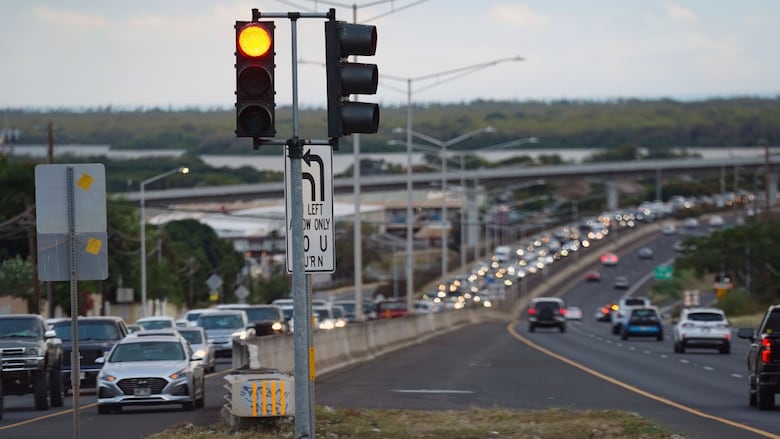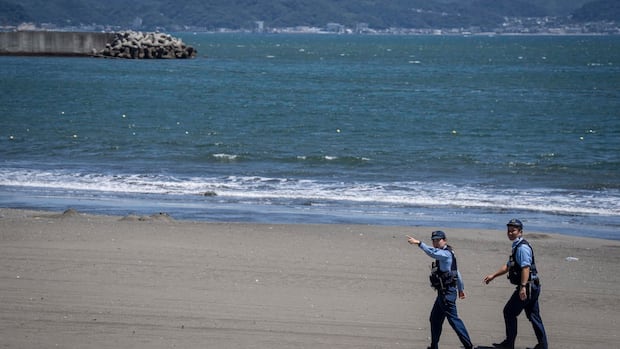'Anxiety level was high': Tsunami warnings trigger flood of evacuations
Millions flee coastlines in Japan, Hawaii after massive quake

Ottawa resident Mark Kirchhof and his family were looking up beaches from their vacation residence in Hawaii on Tuesday afternoon when they stumbled on a news article — a powerful earthquake had just occurred off Russia's eastern Kamchatka Peninsula.
Shortly after, their phones lit up with emergency alerts, warning that Hawaii could be in the path of potential tsunamis.
"The anxiety level was high," Kirchhof told CBC News.
Residents in Hawaii, Japan and along the western coasts of the Americas scrambled on Tuesday after the 8.8 magnitude quake triggered tsunami warnings and widespread evacuation orders.
Sirens echoed across Hawaii and traffic came to a standstill on highways in Honolulu even in areas away from the sea as residents and tourists sought higher ground. Following the first warning, police took to the beaches with megaphones, instructing stragglers to get back from the water.
In one Tiktok video, posted by a woman staying at a hotel on Waikiki Beach, sirens fill the air as she pans over a seemingly calm, empty beach.
"A little eerie, not going to lie," Tiktok user @everythingcaleen says in the video, adding that she had been told the waves could hit in 30 minutes. She said in previous videos that she'd been told to shelter in place since she was on a high enough floor of her hotel. CBC News has verified the location as Waikiki Beach.
Kirchhof, who was on the Big Island of Hawaii with family to celebrate his in-law's 50th wedding anniversary, said it was "surreal" to hear the sirens, which repeated hourly until the evening after the initial warning.
"Another thing they did is they had a plane flying around with loudspeakers announcing that a tsunami was coming," he said. "So we were well informed throughout the whole process."
The quake appears to have been the world's strongest since that of March 2011, off northeast Japan, which triggered massive tsunamis and meltdowns at a nuclear power plant.
Tuesday's quake led to evacuation orders for nearly two million Japanese residents, who streamed to evacuation centres.
Kirchhof and his family were on higher ground just outside of the evacuation zone, but could see the clogged highways leading away from the ocean, he says. The stress didn't start to lift for them until later in the evening, when news reports indicated the waves weren't as large as feared.
"Thankfully the size of the waves and the damage that was caused was less than expected," he said, adding that they felt "lucky" that the situation wasn't as dangerous as it could've been.
Small tsunamis were reported in Japan, Alaska and Hawaii, resulting in some injuries but no fatalities.
Authorities in Japan, Hawaii and parts of Russia have since downgraded the tsunami warnings to advisories — meaning there could be strong currents, dangerous waves and flooding on beaches or in harbours.
"As you return home, still stay off the beach and stay out of the water," said James Barros, administrator of the Hawaii Emergency Management Agency.
Parts of the B.C. coast were under also advisories that have since been cancelled.
Katsu Goda, earthquake and tsunami expert and Canada Research Chair in multi-hazard risk assessment, told CBC News that the early warning systems allowed countries around the Pacific to react promptly.

"It's important for us to follow those kind of instructions, advisories," he said.
As long as advisories are in place, "we just have to be aware and be away from the waters," he added.
In the initial stream of evacuations, there were long lines at gas stations near downtown Honolulu, with some closing early so that workers could go home.
Jimmy Markowski, on a family vacation from Hot Springs, Ark., ended up at a closed Texaco station in the Nuuanu-Punchbowl neighbourhood after fleeing a Waikiki beach resort — in a caravan of three cars carrying 15 people.
"All we're trying to do is just figure out what we're going to do for the next three or four hours," he said.
"We've got water, we got some snacks ... we're going to stay elevated. This is our first tsunami warning ever. So this is all new to us."
Honolulu resident Kale A'i stopped at the same station — after spending more than an hour on what would normally be a 12-minute drive from his home near the coast. He was trying to get to his grandfather's house farther inland.
"I've always tried to be a little bit more cautious because it's better to be safe than sorry," he said.
A resident in the city of Petropavlovsk-Kamchatsky in Russia said the shaking from the quake went on for several minutes.
"I decided to leave the building," said Yaroslav, 25. "It felt like the walls could collapse any moment. The shaking lasted continuously for at least three minutes."
Tsunami waves struck parts of the Kamchatka Peninsula, partially flooding the port and a fish processing plant in the town of Severo-Kurilsk and sweeping vessels from their moorings, regional officials and Russia's emergency ministry said.
With files from The Associated Press and Reuters



